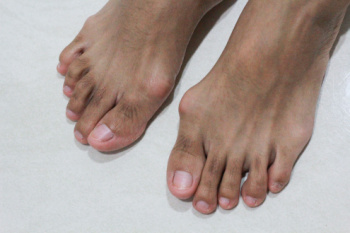Facts About Bunions
Tuesday, 29 October 2024 00:00
A bunion is a bony bump that forms at the base of the big toe, causing the toe to angle toward the second toe. This condition often leads to discomfort and changes in foot shape. Several factors contribute to the development of bunions, including genetic predisposition, wearing tight or ill-fitting shoes, and certain foot conditions such as flat feet. Signs of a bunion include redness, swelling, and pain surrounding the affected joint, particularly when wearing shoes. Individuals may also notice a visible bump on the side of the foot, which can become more pronounced over time. In some cases, the condition can lead to difficulty in walking or participating in physical activities. If you see the beginning signs of a bunion forming, it is suggested that you contact a podiatrist who can monitor its progression, and offer you relief tips.
If you are suffering from bunions, contact Milos Tomich, DPM of Dr. Tomich Foot & Ankle Health Center. Our doctor can provide the care you need to keep you pain-free and on your feet.
What Is a Bunion?
A bunion is formed of swollen tissue or an enlargement of boney growth, usually located at the base joint of the toe that connects to the foot. The swelling occurs due to the bones in the big toe shifting inward, which impacts the other toes of the foot. This causes the area around the base of the big toe to become inflamed and painful.
Why Do Bunions Form?
Genetics – Susceptibility to bunions are often hereditary
Stress on the feet – Poorly fitted and uncomfortable footwear that places stress on feet, such as heels, can worsen existing bunions
How Are Bunions Diagnosed?
Doctors often perform two tests – blood tests and x-rays – when trying to diagnose bunions, especially in the early stages of development. Blood tests help determine if the foot pain is being caused by something else, such as arthritis, while x-rays provide a clear picture of your bone structure to your doctor.
How Are Bunions Treated?
- Refrain from wearing heels or similar shoes that cause discomfort
- Select wider shoes that can provide more comfort and reduce pain
- Anti-inflammatory and pain management drugs
- Orthotics or foot inserts
- Surgery
If you have any questions, please feel free to contact one of our offices located in Milwaukee and Wauwatosa, WI . We offer the newest diagnostic and treatment technologies for all your foot care needs.




